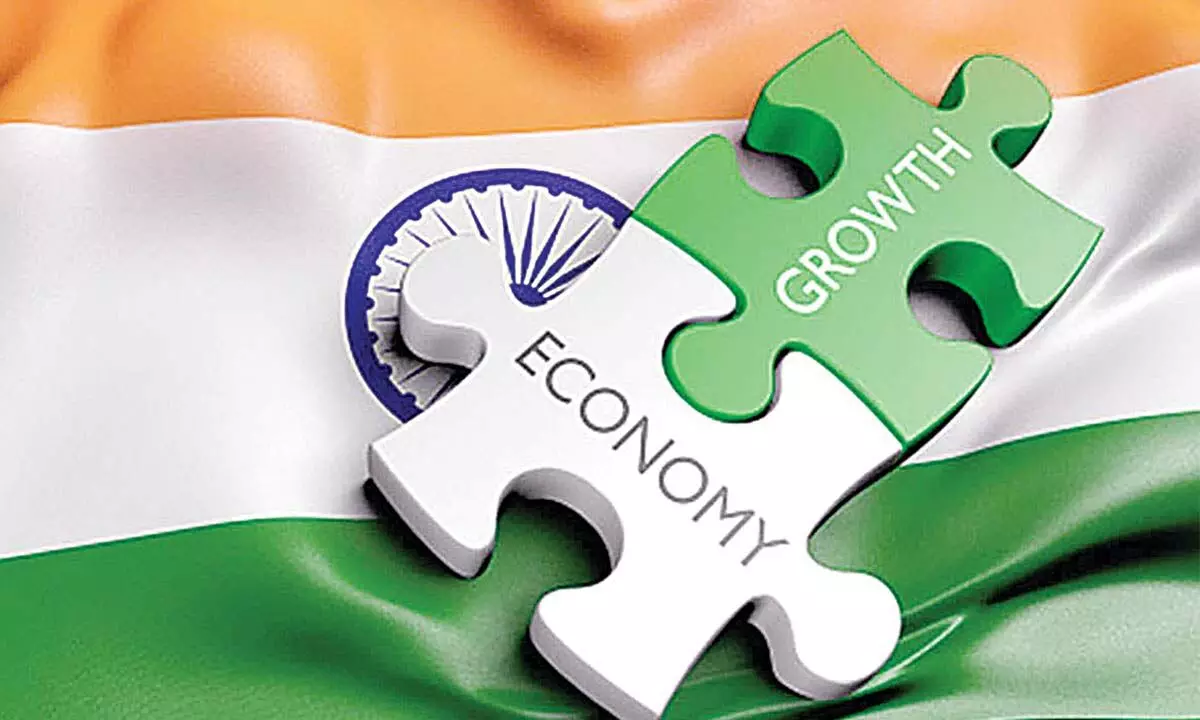Can India beat IMF growth projections?
For India, IMF estimates the growth of 7.4% for this fiscal and 6.1% for FY24. In both cases, it is lower by 80 basis points from the IMF’s earlier estimates
image for illustrative purpose

The International Monetary Fund's (IMF's) dismal global growth outlook, 'overwhelmingly tilted to the downside,' should spur Western nations as well as India to take corrective measures right away.
"The outlook has darkened significantly since April. The world may soon be teetering on the edge of a global recession, only two years after the last one," top IMF economist Pierre-Olivier Gourinchas wrote in an article accompanying the release of an update to the IMF's World Economic Outlook report.
The IMF has slashed its global growth forecast for 2022 by 40 basis points to 3.2 per cent. For 2033, it has pegged growth at 2.9 per cent. For India, it estimates the growth of 7.4 per cent for this fiscal and 6.1 per cent for 2023-24. In both cases, it is lower by 80 basis points from the IMF's earlier estimates.
There are mainly two causes for the impending recession: first, the war in Ukraine; and, second, policy changes in the US following the exit of President Donald Trump. In fact, the two are linked to some extent.
The Russian-Ukraine war is not just destroying the smaller Eastern European country but also adversely affecting the global economy. It has occasioned a spurt in petroleum prices all over the world and disrupted the movement of food-grains, resulting in fears of debilitating food shortages, if not famines, in several countries.
Also, owing to the disruption of various supply lines and of course costlier fuel, prices have shot up countries across the continents. Who would have thought of 9.1 per cent inflation in the US? With the Federal Reserve keen on reining in prices, growth has suffered; it is forecast to have risen just by 0.5 per cent during the April-June period, according to the median estimate in a Bloomberg survey of economists.
The origins of the war itself have to do with post-Trump policy changes. With the ascension of Joe Biden, climate change extremists, who dominate the ruling Democratic Party, enforced anti-fossil fuel policies. Unsurprisingly, the US, which had become the net energy exporter under Trump, turned the net energy importer, resulting in the rise of prices not just in America but all over the world. For America is the biggest consumer of petroleum products.
Concomitantly, higher fuel prices enriched oil-exporting nations like Russia and Saudi Arabia. Worse, it emboldened and empowered Russian President Vladimir Putin. Even without Biden, Putin's Russia was behaving like a rogue state; Biden's sloppy foreign policy - the messy US exit from Afghanistan last year being an example - seems to have convinced that the US was in decline as a global power.
Unfortunately, there are no signs indicating that the Biden administration intends any course correction. Which means that oil production in the US is unlikely to rise, so fuel prices across the globe are not likely to come down drastically in the foreseeable future.
Nor is Putin relenting in his war against Ukraine. Russian missiles hit the port city of Odessa on Saturday, smashing the UN-brokered deal that was intended to ease global food shortages by recommencing grain exports from the Black Sea region.
Against this backdrop, India can either pray for the international situation to improve or act to shield itself from the more and stronger external shocks. The recipe for action is simple: expedite, intensify, and expand liberalization.
Economic reforms have to not just reach the areas, like agriculture and labour laws, which have remained untouched by liberalization since 1991, but also travel to states which continue with the worst kind of populism.
The Narendra Modi government has shown intent to do that. It has recommenced the privatization process. It brought three excellent laws to transform the farm sector a couple of years ago, but the manner in which was done was so shoddy, indeed gauche, that there was a massive movement against the laws and the government was forced to annul the laws. The government is doing serious work to improve infrastructure.
Further, PM Modi has spoken strongly against the freebie culture - the first time a major political leader of any party did that.
However, all the good intentions and soothing statements have to get transformed into policy, decision making, and execution. The sooner the governments in India - at the Centre and in states - do that, the better it would be for the economy. This may help us beat the IMF growth projections.

